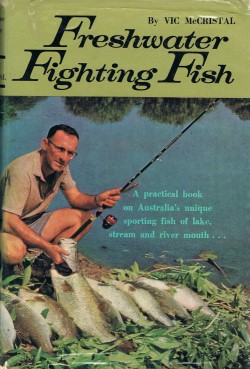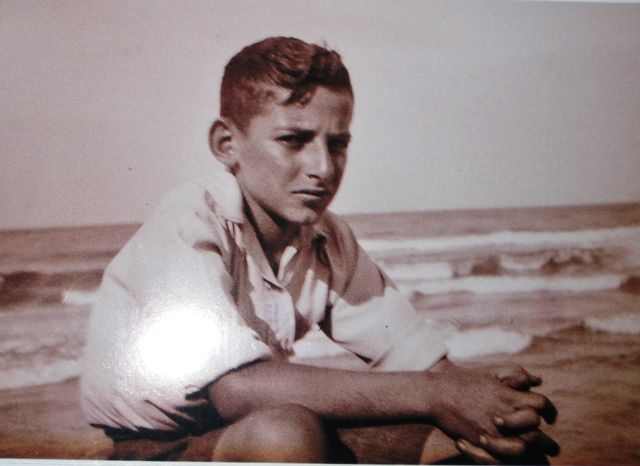- Vic McCristal
Recently I have been purchasing all the Vic McCristal books I can get my hands on.
McCristal is rightfully regarded by many Australian anglers as the greatest fishing writer this vast country has produced. There are two sides to this claim. First and foremost, McCristal was an innovative and thoughtful angler who brought light sport fishing techniques to the mouths of many Australian fish who had previously known only net, handline and spear. As far as I know, he was the first fishing writer to systematically write about the wilds of what is now Kakadu and the Kimberley region and to describe lure techniques for coercing these areas' mighty angling species.
McCristal conversed with fisheries scientists and every informed source he could meet in order to understand Australian angling species. He had a special respect for tarpon and giant herring, fish that today I still believe are largely under-rater by Northern anglers, who bypass these species for, well, tastier fish; or else do not target these wonderful acrobats with the light tackle that truly does them justice. McCristal's guidebook works such as Freshwater Fighting Fish and Great Fishing With Lures are in many respects as innovative and informative today as when they were written in the late 1960s. Certain information is, as one might expect given guidebooks over 40 years old, now outdated. But there are special insights that come from McCristal's own application of angling intelligence to an experience that was often the vanguard of its field: seeing sport fishing possibilities and applying techniques to what were still new species of sport fish for the first time. Such unique insights, in nuptial with lived experience, contain a special magic that shall always resonate for readers. Which brings me to the second aspect of Vic McCristal's greatness, which is that he is a great Australian writer.
McCristal's prose style contains that blend of British-English command and accuracy with the idiosyncratic, landscape-attuned tone, colour and movement of Australian-English. It is a language that is both educated and lodged in the uniqueness of McCristal's Australian experience of the country and its characters. It is a language one also finds in writers such as the early Thomas Keneally or Frank Hardy. This language mirrors the diversity of escarpment country, with its rough hewn peaks and drops, crag-grappling foliage and poetic flourishes of monsoonal forest and lucid, pandanus lined, fish-shimmering streams wending between. To cut to the chase, McCristal is not only a pleasure to read: his prose is a part of the history of our country's language and literature. It is, as literature, a kind of equivalent of the uniquely Australian rock sound produced during the early 1980s or the Australian Modernist art of the 1940s, a time before the homogeneity of mass, popular culture eroded idiosyncrasy on behalf of economic and marketing interests... a time before every populist cultural product was market tested prior to release. But unlike the puerile 'national culture' cultivated during the Howard years, McCristal's Australia really is uniquely Australian. For what makes this country unique is its landscape, its rivers and sea and the strange creatures that inhabit it. McCristal's love of the country, its landscapes and its fauna, lead him towards ecological positions that the political Greens would agree with. In The Rivers and the Sea he writes "I've been told that many conservationists are only trouble makers. It would be funny if it weren't so tragic - those I know are the least warlike of human beings. What kind of man would it be who could blandly suffer the earth's injury and not speak up?" The German philosopher Immanuel Kant defined the Enlightenment with the phrase sapere aude: have the courage to use one's own reason; dare to know. This is what McCristal does, basing his opinions on his own lived experience rather than jumping on another's boat. It is a lesson we all can benefit from.
Through his direct contact with the people who inhabited the wild places he cast his lures into, McCristal came to believe that colonisation had wrongfully affected the indigenous people of this country, and that, in general, those who had their culture still largely in tact were more human than the European Australians: "I can't convince myself that the efforts to convert the Aborigines to our own stilted format is better for them than their original tribal life. The process of accelerated change is being forced on people with a different and (to me at least) more pertinent philosophy. Their lives have always been links in a long, perpetual chain, while ours have been self-centred and erratic, often arrogant and devoid of comprehension of the truth of ourselves, at least as we relate to the ground beneath our feet." Saying such things in the late 1960s - and in books written for a white Australian, populist audience - took both courage and a strong fidelity to experience.
Behind Vic McCristal's great Australian prose lies a self-hewn philosophy of nature: the best a human can achieve in life is to be intimately attuned to the natural world: "I seek to show that with clean rivers and a healthy ocean, man's spirit still has its wide horizon." That this position arose through hunting and fishing is not a chance event, but is rather what happens to anyone sufficiently devoted to such activities, which lodge the hunter or angler in the natural environment in a uniquely attentive and attuitive manner.
"When a man understands the two kinds of hunting, it becomes difficult to maintain enthusiasm for the artificial kind." By 'artificial kind', McCristal means hunting or fishing simply to kill rather than taking a creature's life for food. The kind of hunting shown in the infamous kangaroo scene of what is perhaps Australia's best film, Wake In Fright. When people, generally shocked, ask me why I release fish, I tell them it is because I have spent so much time stalking them and observing their behaviour that I appreciate fish too completely as uniquely living beings to regularly kill them. Fish have a right to live of their own accord, not just as an extension of the human appetite. Of course I do sometimes take a fish to eat - of late, each time I hook a queenfish I have hoped it was a mackerel, which I very much enjoy eating. This sentiment is something every keen sport fisherman understands, and we find its philosophy nowhere better espoused than in Vic McCristal's writing. A hunter or angler should only kill what they intend to eat, and should always bear in mind conservation of the species one chases. This gestalt switch in ecological attitude which takes place in those initially most committed to hunting and angling stands as a testament to the special orientation towards nature that is native to these activities. Perhaps we become more fully immersed in the kind of hunting and gathering that the long development of the human body has evolved in relation to. It is true that, in these activities, the senses intimately absorbed by the natural world, we become gladder, throwing free the stress of the modern and highly unnatural environments of work in which our badgered bodies etch out a living five days a week.
"(H)umility in our regard for the earth and the life systems on it is not misplaced."
In one of his books, McCristal tells readers the story of how he turned towards a life in pursuit of a happiness written in the natural world. He had heard rumour of a run of large bream along a local beach and, on the way back to work after a break, decided that tackling the rare event of a run of big sea bream was more important than returning to work. The beach and angling, thankfully for his readers, won out. As recompense and explanation, when McCristal turned up to work the following morning he presented a pair of 2 kilo bream to his boss. The boss promptly threw them back. McCristal then understood that his boss, following the rules, was really just ruled by fear and resentment. From that incident and momentary decision Australia's greatest fishing writer was born.
One of the most pertinent lessons we may learn from McCristal's adept writings on angling is that fisherman are not dunces. Now let me explain what I mean. Companies and media that are focused on making the most money from the greatest number of 'consumers' tend to make 'products' that have the widest reach, simplifying writing (copy) and marketing in such a manner that the target is assumed to be a mass idiot whom, massaged the right way, will cough up the appropriate profit or response. This economic interest has a lot to answer for, not only in terms of 'dumbing people down' by always catering to and never challenging prejudices and wrong beliefs or opinions; but for making rare the kind of journalistic writing, literary in both style and content, that we find in Vic McCristal's works. For McCristal educates as he guides readers, never assuming that his reader's are dullards. His language is alive with unique human feeling and insight, and it is a great testament to the special kind of intelligence the long periods of angling in nature brew in a fisherman that so many anglers will cite McCristal as their favourite fishing writer. It has been a revelation for me to scour Vic McCristal's books, and I thank the forum user who suggested I track them down. It has already improved my fishing.
I have noticed across the years a trend to hang a crank tag on conservationists of every kind. Some deserve it, some don't. But you will observe that those who are exposed to an intimate knowledge of the sea, the rivers or the land itself, usually change their views rapidly. Men who once killed are now the primary fighters in defence: Dr Hans Hass, Jacques Cousteau, Jacques Picard, Ben Cropp, Ron Taylor, John Harding; all with one thing in common.
The Sea made them famous. They love it and they know it - and they're desperately concerned for it. They merely know their subject, as I know mine, closely enough to know when it is being hurt.
- Vic McCristal, Preface to The Rivers and the Sea.







Love the blog! Keep it up!
ReplyDelete